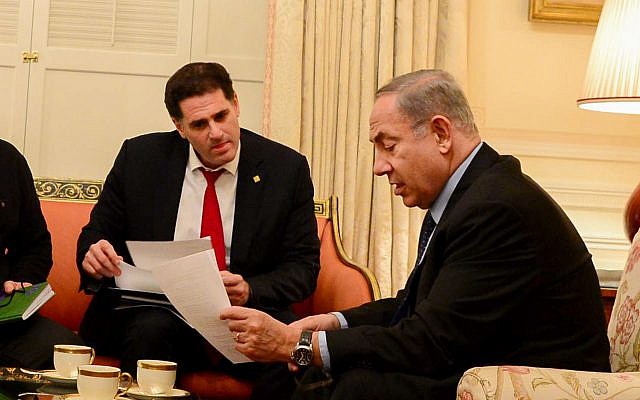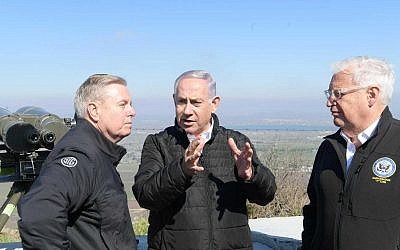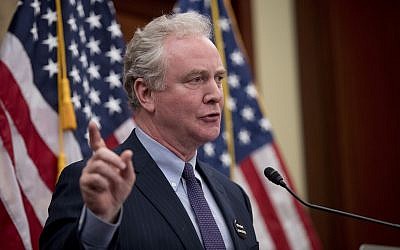Israeli diplomats working to remove term from text being crafted by Republican Sen. Lindsey Graham and Democratic Sen. Chris Van Hollen

Israeli diplomats in Washington have been working to prevent the Senate from passing a bipartisan resolution that would endorse a two-state solution to the Israeli-Palestinian conflict, according to a report published Wednesday.
The resolution, which is expected to be tabled soon, was drafted by Republican Sen. Lindsey Graham and Democratic Sen. Chris Van Hollen and is seen as a means of putting pressure on the White House ahead of the release of its peace plan, according to the report on Israel’s Channel 13 and the Axios web site.
“Both Senators Van Hollen and Graham are long-time supporters of a two-state solution and are working on the best way to advance that commitment in Congress,” Van Hollen spokesperson Bridgett Frey told Axios.
However, Israeli diplomats, led by Ambassador Ron Dermer, have been trying to get them to take out the references to the two-state solution from the text, the report said, citing Israeli diplomats and Congressional staffers.
The Israelis don’t mind a general resolution calling for direct negotiations between the parties with no preconditions, so long as it doesn’t deal with the end game or the parameters of such talks, the report said.

The report comes with the future of the Trump peace plan unclear and likely to be delayed again with Israel heading to fresh elections in September.
In the run-up to elections, Prime Minister Benjamin Netanyahu appeared to move even further away from the idea of a two-state solution, promising several times to “apply Israeli sovereignty” or “extend Israeli law” to all the West Bank settlements, and said he hoped he would be able to do so with American support.
Some saw the announcement as a play for right-wing votes and expressed doubts over whether he would continue to push for such moves after the election.
US officials drafting the plan have said the term two-states in unhelpful as both sides interpret it differently.
And US President Donald Trump has been ambiguous about his support the policy.

Presidents Bill Clinton, George W. Bush and Barack Obama all sought to broker a two-state solution. But Trump, who has called a Middle East peace deal one of his biggest priorities, had long resisted specifically endorsing that framework.
“Bottom line: If the Israelis and Palestinians want one state, that’s okay with me,” he said at the UN General Assembly last year. “If they want two states, that’s okay with me. I’m happy, if they’re happy.”
“I’m a facilitator. I want to see if I can get a deal done so that people don’t get killed anymore,” the US president said.
Trump said that reaching a two-state solution is “more difficult because it’s a real estate deal” but that ultimately it “works better because you have people governing themselves.”
After Trump spoke in favor of the two-state solution, Netanyahu said that the United States accepts that even if a two-state solution is achieved to the Israeli-Palestinian conflict, Israel will retain overall security control of the West Bank.
Netanyahu said that under any peace accord, Israel would retain security control from the Jordan River to the Mediterranean Sea. “I am sure that any US peace plan will reflect that principle to a great extent, maybe even entirely,” Netanyahu said.
As reported by The Times of Israel
